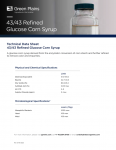'Natural' retains ambiguous regulatory status
jurisdictions and no resolution is in sight for a category gaining
attention as consumers turn away from the synthetic production of
foods and beverages and the ingredients used in them.
This was the general consensus of the Natural Ingredients Symposium 2008 held in Dusseldorf this week where industry and academia debated this topic and others. Chairing the second and final day, Dr Landry Le Chevanton, global regualtory affairs manager manager at DSM Nutritional Products, gave a presentation that highlighted the regulatory uncertainty surrounding a group of ingredients that included functional nutrients such as herbal extracts, flavours and fragrances. Defining natural "There is guidance in the area in the European Union among some member states but there is nothing uniform," Le Chevanton said, noting there had been many cases where food products had been forced to alter the marketing as regulators took issue with the use of terms like 'natural'. He cited the example of a ham product in France that had replaced nitrate - used to extend shelf-life - with a natural ingredient and then applied a 'natural' tag to the product marketing. The French regulator took issue with this and the product was re-branded with the 'natural' marketing removed. "If you are going to use a term like 'natural' on the label of a food item you need to be aware that safety and healthfulness cannot always be assumed, particularly when other ingredients in the product are brought into the equation," he told the Symposium. A panel discussion noted there was little momentum toward a natural ingredient definition because regulators were aware of the malleability of the term and had therefore steered clear of it. "But this is not so important because consumers have their own preconceptions of what natural is and that creates value for the ingredients," said Hartmut Sannecke, marketing director, of Cognis Europe Nutrition and Health. He said the most popular natural ingredients in foods and beverages were green tea, collagen, aloe vera, pomegranate, ceramides, CoQ10 and licorice. Collagen, CoQ10, aloe vera, alpha linolenic acid, gamma linolenic acid, green tea and lutein were the most popular in food supplements. However one delegate from a large flavours and fragrances supplier said he had attended the conference to see how the industry was dealing with a category that had notorious supply issues. "We have been in this business a long time but sometimes you wonder if the so-called 'extra value' of going natural is worth the risk and heavy investment that goes with it," he told NutraIngredients.com. Other questioned the patenting system and the value of patents that were issued without recourse to in vitro studies or with studies conducted with extracted molecules and not entire food matrices. In the US the Food and Drug Administration (FDA) retains an ambiguous position in regard to 'natural', despite increasing pressure to define the term.










